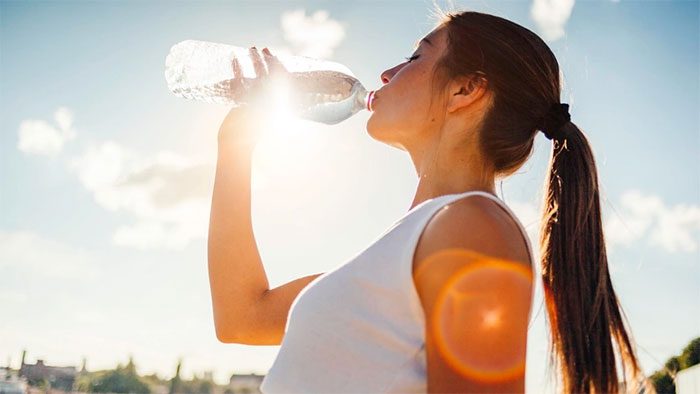When the weather is hot, ensuring adequate fluid intake helps prevent dehydration. However, not everyone knows how much water they need to consume to stay hydrated.
In summer, as temperatures rise, the body loses more fluids than usual. This means you’re more susceptible to dry skin, sweating, and dehydration. As the weather heats up, the body begins to sweat to regulate its temperature.
Each person has approximately 2.6 million sweat glands that work to keep cool by releasing fluids through the pores. The key is to continuously replenish the fluids lost.
However, the question arises: how much water should we consume, and where can we get these fluids from?
Daily Water Requirements
According to the Huffington Post, Dr. Lauren Minchen, a nutrition expert in New York, states that each individual’s water needs vary based on weight and body type.
“The exact amount of water each person needs is different; the average is about 2 liters. However, those who are very active and aim to stay adequately hydrated may need to consume 2-4 liters of fluids, and this requirement can vary within that range as outdoor temperatures change,” Dr. Minchen explained.

When the weather is hot, you need to drink more water than necessary to avoid dehydration. (Photo: Thesun).
People with sedentary lifestyles and those working in air-conditioned environments, where there is little chance of losing fluids through sweat, should not drink more than 2-2.5 liters of water. Water intake may be higher for those who exercise regularly, as muscles require more water to function properly and maintain muscle mass.
According to the Cleveland Clinic, you should drink additional water before, during, and after any physical activity, especially if outdoors. The American College of Sports Medicine recommends drinking about 590 ml of water 1-2 hours before exercising, around 295 ml of water for every 10-15 minutes during exercise. After working out, you should drink 470-710 ml of water to replenish the fluids lost.
Amy Shapiro, a nutrition expert and founder of Real Nutrition NYC, notes that the body works hard to maintain a cool temperature in hot weather by sweating. It is crucial to replenish the fluids lost through sweating to prevent dehydration.
“One of the best ways to do this is to drink water throughout the day and before you actually feel thirsty,” Shapiro advised.
Mayo Clinic experts recommend that women should drink about 2.7 liters of water daily, while men should aim for 3.7 liters.
Signs of Dehydration
It’s important to pay attention to signs of dehydration to increase your water intake and avoid serious issues.
The color of your urine can indicate whether your body needs more water. Typically, urine should be close to the color of lemonade, and you should drink more water if it turns dark yellow. Fatigue, dry skin, muscle cramps, constipation, and dizziness are also signs of dehydration.
Age can also affect your body’s hydration level and how susceptible you are to dehydration. Andrea Moss, a holistic nutrition coach and founder of Moss Wellness, explains that we tend to feel less thirsty as we age.
This coach shares: “Our thirst mechanism weakens with age. Therefore, developing the habit of drinking water throughout the day at any age is a great idea to ensure the body is always adequately hydrated.”

A dehydrated body can easily become fatigued, exhausted, have dry skin, and experience dizziness. (Photo: Krone).
Where to Get Hydration?
Eating foods with high water content can also help provide fluids for the body.
Expert Shapiro states: “Eating fruits and vegetables can play a significant role in healthy hydration. In summer, watermelon is an excellent source of hydration as it contains up to 80% water. Additionally, cucumbers, celery, broccoli, and spinach also contribute to your body’s water intake.”
Purified water, filtered water, spring water, high pH water, and electrolyte solutions are also effective options. Additionally, if you are exercising intensely or for more than an hour, you should use sports drinks to replenish the electrolytes lost through sweating. When dehydrated, you may lose essential electrolytes like potassium, calcium, and magnesium, which are vital for important bodily functions.
According to Forbes, people should view hydration as a lifestyle change. We should carry a full water bottle with us everywhere – to work, school, in the car, and at the sports field.
You can start and end your day with a glass of water. By making these small changes, you can quickly increase your water intake and mitigate the effects of dehydration.



















































